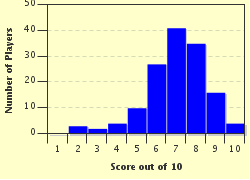Quiz Answer Key and Fun Facts
1. Which of these is NOT an example of RAS syndrome (Redundant Acronym Syndrome syndrome)?
2. The DVD does not need to be called a DVD disc, although it often is. The final D stands for disc; what does the first D stand for in the acronym?
3. Reference to the HIV virus is tautological because the V stands for virus. What do the first two letters stand for?
4. In another example of Redundant Acronym Syndrome, what word is often used tautologically after the acronym GPS?
5. The helpful, but grammatically-challenged assistant in the computer shop asked me how much ROM memory I needed for the BIOS system in my computer, and how much RAM memory I thought would be needed. He then went on to suggest that I should consider getting a USB flash drive to use for my system backups. Which of these terms was NOT a tautology?
6. Which of these phrases is a tautology, because the name of the dance style means 'dance' in its original language?
7. When you receive an invitation with the annotation 'Please RSVP', you know that the word please was unnecessary because it duplicates one of the words already present in this abbreviation. Which French word caused this pleonasm?
8. Which of these deserts is the odd one out, because the name used for it in English is NOT derived from a word in another language that means desert?
9. All of these rivers share their name with an American state. Three of them, at least according to some sources, have a name based on a word for river or water in a Native American language. Which is the odd one out?
10. Apparently Torpenhow Hill, often cited as a quadruply-tautological place name, does not actually exist, but there is a Cumbrian town called Torpenhow. Which of these elements in the name comes from an Old Norse word meaning hill?
Source: Author
looney_tunes
This quiz was reviewed by FunTrivia editor
agony before going online.
Any errors found in FunTrivia content are routinely corrected through our feedback system.

